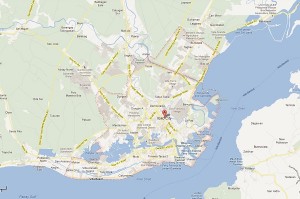
Kalipunan ng Damayang Mahihirap (Kadamay), an alliance of urban poor groups in Panay and Guimaras and Pinag-isang Samahan ng mga Tsuper at Operator Nationwide (Piston), said the proposed ordinance would not solve the traffic congestion in the city and would bring inconvenience to commuters.
“Farmers will find it harder to bring their products to the city, and students and employees will be paying more for their fare,”said Perjerie Panila, spokesperson of Kadamay-Panay and Guimaras.
The proposed 2013 Comprehensive Perimeter Boundary Ordinance (PBO) is pending before the city council’s committee on transportation chaired by Councilor Plaridel Nava.
The proposed ordinance seeks to widen the coverage of the 2002 PBO, which was implemented in 2004.
The 2002 PBO regulates the entry of buses and jeepneys in the city and requires them to park in designated terminals outside the city.
The ordinance allows the entry of 40 percent of total jeepney units from the neighboring towns of Leganes, San Miguel, Oton, Sta. Barbara and Pavia and 10 percent of passenger jeepneys from the other 38 municipalities of Iloilo province.
Under the proposed ordinance, all provincial jeepneys and buses will be prohibited from entering the city except when transporting patients to hospitals on emergency cases.
Public utility vehicles (PUVs) transporting crops, foodstuffs, goods and produce from outside the city will also be allowed in the city from 10 p.m. to 5 a.m.
Nava said a new ordinance is necessary to address traffic congestion in the city’s main streets especially during peak hours.
He said the 2013 PBO would be implemented along with other measures including the ban on parking on main streets of the city, prohibition of pedicabs and tricycles, clearing of sidewalks from vendors and improving the traffic management office and system.
But Edgar Salarda, Piston coordinator on Panay Island, said the proposed ordinance puts the burden on resolving traffic congestion to PUVs and commuters from the province.
Salarda said privately owned vehicles should also be regulated because these grossly outnumber PUVs.
Citing data from the National Economic Development Authority and the Land Transportation Franchising and Regulatory Board (LTFRB), Salarda said there were 16,135 privately owned vehicles and 2,783 PUVS in the city as of the first quarter of this year.
In Iloilo province, private vehicles reached 28,401 and 4,739 for PUVs during the same period.
“Private vehicles should be the priority of regulation because they outnumber PUVs by more than 1:5. The passenger vehicles also cater to more commuters compared to private vehicles,”Salarda said.
Nava said the city council was not inclined to adopt the “odd-even” plate number-based traffic ban for private vehicles because this could paint a negative image of the city.
“This could be implemented if the situation is desperate because other bigger and more congested cities outside of Manila have not even implemented this scheme,” he told the Inquirer.
Panila said the total ban on PUVs from the provinces would result to more transportation woes for commuters who belong mostly to lower-income families who cannot afford to own vehicles.
He said that if the total ban is implemented, passengers from Leganes and Pavia towns will have to spend an additional P24 daily or P528 monthly.
Those opposed to the proposed ordinance have called for further studies and consultations before passing and implementing the measure.
The proposed ordinance will be discussed during public consultations of the city council’s committee on transportation Monday and on Wednesday. A transport summit will also be held this month along with the provincial government, according to Nava.